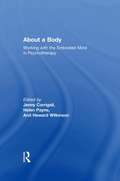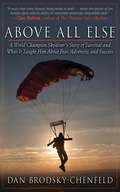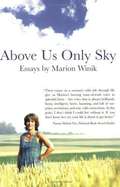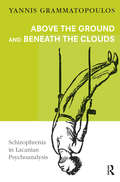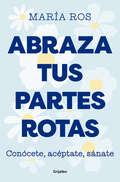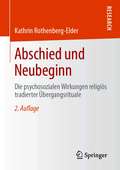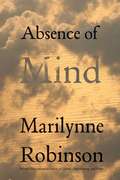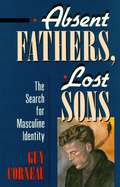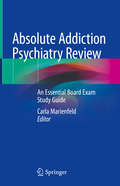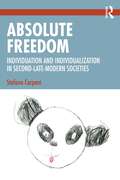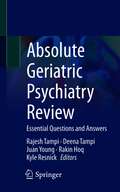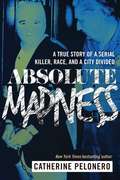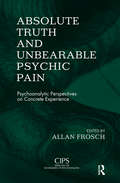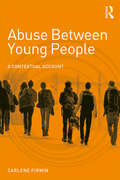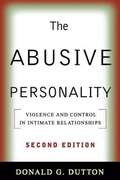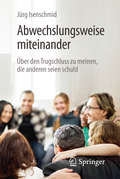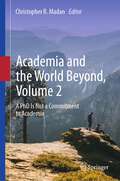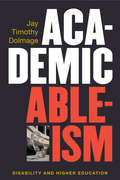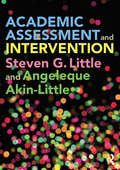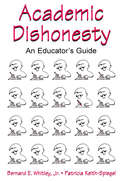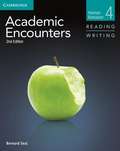- Table View
- List View
About a Body: Working with the Embodied Mind in Psychotherapy
by Jenny Corrigall, Helen Payne and Heward WilkinsonHow does our body reveal us to ourselves? The body can inform the work we do in mental health. This unique collection invites the reader to consider the way we think about the embodied mind, and how it can inform both our lives and our work in psychotherapy and counselling. The body is viewed as integral to the mind in this book, and in the approaches illustrated in it. Instead of splitting off the body and treating the patient as a body with a mind, contributors from a variety of approaches ask the reader to consider how we might be with, and work with, ‘bodymind’ as an interrelated whole. Subjects covered include: the application of affective neuroscience understandings to life as well as to clinical issues the body in psychotherapy with a person who is facing death the history, significance and scope of body psychotherapy today psychoanalytic approaches to working with the embodied mind authentic movement groups in the development of wellbeing in our bodymindspirit the body and spirituality This book is unique in its pluralism: it includes a wide range of differing views of the importance of the body in psychotherapy, both in theory and in practice, and it relates these to the latest discussions in affective neuroscience. It will be invaluable for those working in, or studying, psychotherapy and counselling, and will also interest those working generally in the mental health field.
Above All Else: A World Champion Skydiver's Story of Survival and What It Taught Him About Fear, Adversity, and Success
by Dan Brodsky-ChenfeldWorld famous competitive skydiver and coach Dan Brodsky-Chenfeld presents proven tools and techniques for success and explains how they can be used in everyday life. Dan survived a plane crash from which sixteen of the twenty-two people on board were killed. He was left critically injured and woke up from a six-week-long coma with a broken neck, broken skull, severe head trauma, a collapsed lung, and other serious internal injuries. Against all odds, Dan recovered and went on to become one of the greatest competitive skydiver in the world. With the love and support of friends and family, Dan was able not only to resurrect his life but return to skydiving to achieve greater heights than he could have ever imagined. His techniques and methods for excelling are applicable to all people, no matter their goals. Dan uses his experiences to teach the lessons heOCOs learnedOCoas a competitor, coach, business owner, father, and husbandOCoto help others achieve their dreams, overcome obstacles, and reach their peak performance.
Above All, Be Kind: Raising a Humane Child in Challenging Times
by Zoe WeilA pioneer in the humane education movement shares an essential guide for new parents who want to raise their children with genuine compassion.In Above All, Be Kind, Zoe Weil teaches parents how to raise their children to be humane in the broadest sense. This includes being more compassionate in their interactions with family and friends, also means growing up to make life choices that demonstrate respect for the environment, other species, and all people. The book includes chapters for early, middle, teenage, and young adult years, as well as activities, issue sidebars, cases, tips, and profiles.
Above Us Only Sky
by Marion WinikFrom the book: There are writers who make you laugh yourself silly, writers who make you weep, writers who make you think more deeply about your life and your world. As NPR listeners and Marion Winik fans know, this sparkling, high-energy essayist does all three. Whether she is regaling us with stories about parenting her brood of children and stepchildren ages four to seventeen, recounting poignant stories of her childhood-or juicier ones from her adulthood-Winik's newest offering is a treat for dedicated fans and new readers alike.
Above the Ground and Beneath the Clouds: Schizophrenia in Lacanian Psychoanalysis
by Yannis GrammatopoulosAbove the Ground and Beneath the Clouds examines the history, conceptualisation, and treatment of the psychotic sub-type of schizophrenia, as this is advocated by psychoanalysis of Lacanian orientation, which is contrasted to modern psychiatry. The book's main focus is the status of the schizophrenic body and language. The ways in which these concepts can be of theoretical and clinical use in contemporary clinical settings are examined throughout. The book consists of three parts. The first part comprises the theoretical investigation of schizophrenia in early 20th century psychiatry and in the theory and teaching of Freud, Lacan, and other influential psychoanalysts. The second part presents the fascinating case of the late 19th century Greek writer Georgios Vizyenos, who invented an extraordinary way to anchor the body before his admission to a psychiatric institution in 1896. The third part discusses the implications of those findings for the contemporary psychoanalytic diagnosis and treatment of schizophrenia. Assisted by examples from the author's clinical experience and from literature and art, this book sheds invaluable light on probably the most obscure sub-type of psychosis.
Abraza a la niña que fuiste: Sana las heridas del pasado y reconecta con tu interior
by Marta Segrelles«Este libro es un bálsamo para las heridas del alma», María Esclapez, autora de Me quiero, te quiero y Tú eres tu lugar seguro Descubre el poder sanador de abrazar a la niña que fuiste ¿Qué tiene que ver mi infancia con las cosas que siento ahora? ¿De qué manera mis experiencias en esos años se relacionan con mi malestar actual? Y, sobre todo, ¿cómo puedo sanar las heridas del pasado que todavía cargo en el presente? Si alguna vez te has hecho alguna de estas preguntas, la respuesta está en tu niña interior. Marta Segrelles, psicóloga referente en el trabajo del trauma y en la terapia con la niña interior, te acompaña en un viaje de autodescubrimiento al pasado. En este libro encontrarás las herramientas necesarias para acompañar a la niña que todavía vive dentro de ti y ser hoy la adulta que te habría gustado tener a tu lado ayer.«Antes de comenzar mi terapia y trabajar con mi niña interior, estaba enfadada y triste conmigo misma. No me sentía una buena adulta, lo que para mí implicaba hacerlo todo bien, no tener dudas y no sentir nunca incomodidad.»Durante el proceso de reparar heridas, he aprendido a identificar lo que siento y a regularlo mejor para darme aquello que necesito; a acompañarme y acercarme cada vez más a esa niña que fui, siendo la adulta que necesité... »Pero todoesto te lo quiero contar en detalle, para que tú también puedas conocerte mejor, reconectar con tu niña interior y transformar tu presente. Empecemos juntas». Marta Segrelles Porque nunca hubo nada malo en ti. ¿Qué encontrarás en este libro? -Relatos personales basados en casos reales de consulta y experiencias de la autora -Materiales gráficos, esquemas e ilustraciones para facilitar la comprensión de los conceptos -Ejercicios prácticos y sencillos para reflexionar sobre las experiencias adversas (incluso aquellas que parecen olvidadas) de la infancia y reconectar con tu niña interior
Abraza tus partes rotas: Conócete, acéptate, sánate
by María RosAtrévete a mirar adentro para conocerte, entenderte y, así, sanar tus heridas y tus partes rotas. «María te enseña y te abraza con cada palabra de este libro; disfrutar de su elegancia y su ternura en estas páginas me parece un lujo». —Lorena Gascón, @lapsicologajaputa Desde que nacemos, nos enseñan que tenemos que sonreír, ser fuertes, sentirnos felices y poder con todo. Nos dicen que no tengamos miedo, no estemos tristes y no nos mostremos vulnerables. Entonces ¿por qué nos sorprende que, ya adultos, no sepamos relacionarnos de una forma sana con nuestras emociones? ¿Por qué nos extraña tener tanto miedo a lo que sentimos, no saber cómo procesar un duelo o cómo enfrentarnos a una situación estresante? Para sanar las heridas internas y superar procesos como la ansiedad o la depresión, necesitamos entender que la vida no va de estar siempre alegres, necesitamos aprender a mirar adentro y a curar aquello que se ha roto. La psicóloga María Ros, nos invita a parar y observar, con una mirada comprensiva, cada una de nuestras heridas, pues solo desde ahí podremos empezar a cerrarlas. Abraza tus partes rotas nos muestra el camino para conocernos, entendernos y sanarnos, con conciencia y compasión, sin juzgarnos. Reseñas:«Abraza tus partes rotas nos ayuda a mandar a la mierda la capa de Superman y Superwoman, para que por fin podamos permitirnos ser vulnerables, y nos da herramientas para ser amables con todo lo que nos encontramos en el camino hacia nosotros mismos. María te enseña y te abraza con cada palabra de este libro; disfrutar de su elegancia y suternura en estas páginas me parece un lujo».Lorena Gascón, @lapsicologajaputa, psicóloga y autora de Querido cerebro, ¿qué coño quieres de mí? «María nos invita a hacer un muy necesario viaje al interior que, conociéndola, no estará exento de sensibilidad; una sensibilidad más que necesaria para abrazar las emociones incómodas y aquellas partes que nos resultan más difíciles de mirar».Montse Cazcarra, @montsecazcarrapsicologia, psicóloga y autora de Amor sano, amor del bueno«Este libro es una bocanada de aire fresco hacia el autoconocimiento y autocuidado que todos necesitamos: mirarnos con amor y vernos a nosotros mismos como nuestros mejores amigos. Somos afortunados por poder leer las palabras de María, una persona, psicóloga y escritora 10 que, en línea con el concepto japonés meraki, hace todas las cosas con amor, poniendo el alma en ello».Inés María Romero Barrio, psicóloga y fundadora de Livera @livera.es
Abrazar hasta el último aliento: Perder el miedo a la muerte de un ser querido desde el amor, la compasión y el cuidado
by Miriam Israel«Abrazar hasta el último aliento es una muy necesitada orientación y enseñanza para quienes deben enfrentar estos momentos tan difíciles y delicados en la vida familiar, cuando un ser querido está en la etapa final de su existencia.» -Marcelo Rittner A lo largo de nuestra vida afrontaremos, de forma inevitable, la pérdida de la gente que amamos. Sin embargo, la despedida sigue siendo un paso decisivo que no siempre sabemos dar correctamente, pues el miedo y el desconocimiento generan muchas dudas que suelen quedar sin respuesta: ¿Cómo podemos brindarle una buena calidad devida hasta el último momento? ¿Qué hacer para aliviar las complicaciones que se presentan al final del camino? ¿Cuáles son las palabras adecuadas para despedirnos? En este libro, Miriam Israel comparte algunas anécdotas personales y otras que ha recopilado durante los años en que ha impartido terapias paliativias para ayudarnos a responder esas dudas, evitar la culpa y el remordimiento, prevenir el desgaste físico, emocional y material de la familia, y superar el miedo, la negación y la ira para despedir a nuestros seres queridos desde el amor, el perdón y la compasión. En resumen, para ayudarnos a entender mejor la muerte y estar listos para recibirla.
Abschied und Neubeginn: Die psychosozialen Wirkungen religiös tradierter Übergangsrituale
by Kathrin Rothenberg-ElderDas Leben ist voller Übergänge. Diese Übergänge müssen in irgendeiner Form angegangen, gestaltet, verarbeitet und in unser Leben integriert werden. Unabhängig vom Glauben an einen Gott geraten dabei immer wieder tradierte Strukturen in den Blick, hier besonders religiös tradierte Schwellenrituale wie Taufe und Beschneidung, Kommunion und Bar Mitzwah, Hochzeit wie Genesungs-, Sterbe- und Beerdigungsrituale. Welche psychologische Funktion haben dabei religiös tradierte Schwellenrituale heute? Dieser Frage wird mithilfe interaktiver Interviews von Funktionsträgern wie Mitgliedern der Religionsgemeinschaften aller drei monotheistischen Strömungen in Nordeuropa nachgegangen, flankiert von zwei Interviews mit Atheisten.
Absence of Mind: The Dispelling of Inwardness from the Modern Myth of the Self
by Marilynne RobinsonEssays from the lectures delivered at Yale University, the Dwight Harrington Terry Foundation. Includes bibliographical references.
Absent Fathers, Lost Sons: The Search For Masculine Identity (C. G. Jung Foundation Bks.)
by Guy CorneauAn experience of the fragility of conventional images of masculinity is something many modern men share. Psychoanalyst Guy Corneau traces this experience to an even deeper feeling men have of their fathers' silence or absence—sometimes literal, but especially emotional and spiritual. Why is this feeling so profound in the lives of the postwar "baby boom" generation—men who are now approaching middle age? Because, he says, this generation marks a critical phase in the loss of the masculine initiation rituals that in the past ensured a boy's passage into manhood. In his engaging examination of the many different ways this missing link manifests in men's lives, Corneau shows that, for men today, regaining the essential "second birth" into manhood lies in gaining the ability to be a father to themselves—not only as a means of healing psychological pain, but as a necessary step in the process of becoming whole.
Absolute Addiction Psychiatry Review: An Essential Board Exam Study Guide
by Carla MarienfeldThis book serves as a tool for general psychiatrists, medical students, residents, and fellows looking for a clinically relevant and high-yield overview of addiction psychiatry in preparation for their board exams – or for everyday clinical practice. Written by expert educators in addiction psychiatry, the text is organized by substances misused and populations affected. This book serves as both a primary learning tool for those new to the field, as well as a reference for those working in addiction treatment. Each chapter begins with summaries of high yield clinical pearls, followed by general information including treatment, and then ends with accompanying board-style review questions. The scope includes understanding substances of misuse and substance use disorders (SUDs), how to evaluate, diagnose, and monitor SUDs, how to treat SUDs both pharmacologically and behaviorally, and critical information for specific populations of patients. Absolute Addiction Psychiatry for Clinical Practice and Review is an excellent resource for all medical students, residents, fellows, and professionals taking certification exams in addiction, including those in psychiatry, addiction medicine, emergency medicine, internal medicine, pain medicine, and others. The chapter "Laboratory Testing for Substance Use Disorders" is available open access under a Creative Commons Attribution 4.0 International License via link.springer.com.
Absolute Freedom: Individuation and Individualization in Second-Late-Modern Societies
by Stefano CarpaniWithin this book, the fields of analytical psychology and sociology combine to examine and explore current social theory and the concept that the author has termed ‘absolute freedom’.This work serves as a vital contribution to contemporary social and psychoanalytic research, unveiling the intricacies of psychological and social dynamics in our current epoch. Stefano Carpani explores the intersection of psychology and sociology, providing a fresh perspective beyond conventional boundaries. It conducts a comparative analysis of C. G. Jung's individuation process and Ulrich Beck's individualization theory, presenting the groundbreaking 'I+I' synthesis. This latter concept acts as a linchpin in deciphering self-identity narratives in the 21st century's dynamic landscape, before the author introduces the concept of absolute freedom, contextualizing it within the multifaceted complexities of contemporary second-late-modern existence.This compelling new book will be of great interest to academics, scholars and students in the fields of analytical psychology, sociology and psychosocial studies.
Absolute Geriatric Psychiatry Review: Essential Questions and Answers
by Rajesh Tampi Deena Tampi Juan Young Rakin Hoq Kyle ResnickThis book provides a comprehensive yet concise review of geriatric psychiatry in preparation for the board exam, or for reference during practice. Written by experts in the field, this text thoroughly reviews over 500 developmental, biological, diagnostic, and treatment questions for board certification. Unlike any other text on the market, this book takes a broader approach to the subject, making it accessible for physicians as well as other clinicians, including nurses, therapists, and social workers. Absolute Geriatric Psychiatry Review is an excellent resource for all clinicians who will care for the mental health of aging patients, including psychiatrists, neurologists, psychologists, therapists, nurses, social workers, nursing home administrators, and all others.
Absolute Madness: A True Story of a Serial Killer, Race, and a City Divided
by Catherine PeloneroAbsolute Madness tells the disturbing true story of Joseph Christopher, a white serial killer who targeted black males and struck fear into the residents of New York in the 1980s. Dubbed both the 22-Caliber Killer and the Midtown Slasher, Christopher allegedly claimed eighteen victims during a savage four-month spree across the state. The investigation, aided by famed FBI profiler John Douglas, drew national attention and biting criticism from Jesse Jackson and other civil rights leaders. The killer, when at last he was unmasked, seemed an unlikely candidate to have held New York in a grip of terror. His capture was neither the end of the story nor the end of the racial strife, which flared anew during circuitous prosecutions and judicial rulings that prompted cries of a double standard in the justice system. Both a wrenching true crime story and an incisive portrait of dangerously discordant race relations in America, Absolute Madness also chronicles a lonely, vulnerable man’s tragic descent into madness and the failure of the American mental health system that refused his pleas for help.
Absolute Truth and Unbearable Psychic Pain: Psychoanalytic Perspectives on Concrete Experience (CIPS (Confederation of Independent Psychoanalytic Societies) Boundaries of Psychoanalysis)
by Allan FroschThis book offers a wealth of original contributions, all promising steps towards a fuller understanding of the phenomenon of "concreteness" and towards more effective approaches to the clinical challenges concreteness poses.
Abuse Between Young People: A Contextual Account
by Carlene FirminAwareness of peer-on-peer abuse is on the rise and is a matter of increasing international concern. Abuse Between Young People: A Contextual Account is the first book to offer a contextualised narrative of peer-on-peer abuse that moves beyond recognising an association between environments and individual choice, and illustrates the ways in which such interplay occurs. Using both sociological and feminist perspectives, Firmin reshapes the way that peer-on-peer abuse is perceived and investigates the effect of gendered social context on the nature of abuse between young people. This text also uses an in-depth case study to explore associations between abusive incidents and young people’s homes, peer groups, schools and neighbourhoods, in addition to broader societal influences such as pornography and politics. National and international policies are woven into each chapter, along with insights from parenting programmes, the troubled families’ agenda, and bullying and community safety policies. Abuse Between Young People presents a clear insight into the various contexts that affect the nature of peer-on-peer abuse, providing a thorough analysis into the debates on this issue. In so doing, Firmin creates a vital contextual approach to safeguarding young people affected by this issue. It is invaluable reading for students and researchers in social work, education, criminology, sociology and psychology, as well as practitioners and policymakers concerned with the protection of young people.
Abusive Personality, Second Edition
by K. O'Leary Donald DuttonThis influential book provides an innovative framework for understanding and treating intimate partner violence. Integrating a variety of theoretical and empirical perspectives, Donald G. Dutton demonstrates that male abusiveness is more than just a learned pattern of behavior--it is the outgrowth of a particular personality configuration. He illuminates the development of the abusive personality from early childhood to adulthood and presents an evidence-based treatment approach designed to meet this population's unique needs. The second edition features two new chapters on the neurobiological roots of abusive behavior and the development of abusiveness in females.
Abwechslungsweise miteinander: Über den Trugschluss zu meinen, die anderen seien schuld
by Jürg IsenschmidJeder von uns ist Teil eines sozialen Netzwerks oder einer Hierarchie. Im Kreise der Familie sind wir es als Eltern oder Jugendliche, beruflich als Vorgesetzte oder Mitarbeitende. Im Alltag sind wir hierbei immer wieder mit Situationen konfrontiert, die zu Störungen oder Disharmonie führen. Natürlich können wir es uns einfach machen und meinen, die anderen seien schuld. Doch trifft dies tatsächlich zu? Jürg Isenschmid versteht es, unser Verhalten in sozialen Gefügen anschaulich zu analysieren und uns erkennen zu lassen, dass jeder dazu beitragen kann, ein friedliches Miteinander zu gestalten – auch Sie!
Academia and the World Beyond, Volume 2: A PhD Is Not a Commitment to Academia
by Christopher R. MadanA common question posed to PhD students from friends and family is, “What will you do after?” But many students are too focused on the PhD itself and have not yet had a chance to sufficiently think about post-PhD life. This book is a collection of 31 interviews with those who have completed a PhD and are now in a non-academic role. Interviewees provide background into their PhD topic and discuss how they transitioned to their current position, including what additional training was necessary and how their PhD training has helped them succeed. In these interviews, two broad non-academic career paths are explored: academic-adjacent careers use research expertise through industry, policy, and publishing; and skill-transfer careers, applying transferable abilities like critical thinking. Recognising a PhD need not lead to a faculty career opens possibilities to leverage doctoral skills in impactful new contexts.
Academia and the World Beyond: Navigating Life after a PhD
by Christopher R. MadanA common question posed to PhD students from friends and family is, “What will you do after?” But many students are too focused on the PhD itself and have not yet had a chance to sufficiently think about post-PhD life. This book is a collection of 22 interviews with those have completed a PhD and then are now in an academic position or another career path. In either case, they have all been successful and have a multitude of insights to share with those who are interested in considering a variety of careers. Academic careers share many commonalities with many non-academic careers, with skills learned within academia being valuable in other career paths as well. Nearly all the individuals interviewed here have been on the job market recently and understand today's job climate. No other book on the market includes the diversity of perspectives presented here. In particular, the focus on psychology and neuroscience draws from a variety of individuals that have similar training but have nonetheless taken divergent paths.
Academic Ableism: Disability and Higher Education (Corporealities: Discourses Of Disability)
by Jay T Dolmage<P>Academic Ableism brings together disability studies and institutional critique to recognize the ways that disability is composed in and by higher education, and rewrites the spaces, times, and economies of disability in higher education to place disability front and center. <P>For too long, argues Jay Timothy Dolmage, disability has been constructed as the antithesis of higher education, often positioned as a distraction, a drain, a problem to be solved. The ethic of higher education encourages students and teachers alike to accentuate ability, valorize perfection, and stigmatize anything that hints at intellectual, mental, or physical weakness, even as we gesture toward the value of diversity and innovation. <P> Examining everything from campus accommodation processes, to architecture, to popular films about college life, Dolmage argues that disability is central to higher education, and that building more inclusive schools allows better education for all.
Academic Assessment and Intervention
by Steven G. Little Angeleque Akin-LittleServing students with academic deficiencies necessitates communication and collaboration among professionals from several disciplines. Academic Assessment and Intervention brings together divergent approaches in order to demonstrate that scientific evidence, rather than biases or previous practice, must determine assessment practices that are selected and used for particular purposes. Similar to a handbook in its comprehensive topical coverage, this edited collection provides a contextual foundation for academic assessment and intervention; describes both norm-referenced and curriculum-based assessment/measurement in detail; considers the implications of both of these assessments on ethnically diverse populations; provides a clear link between assessment, evidence-based interventions and the RTI model; and considers other important topics related to this area such as teacher behavior. Intended primarily for graduate-level courses in education, school psychology, or child clinical psychology, it will also be of interest to practicing professionals in these fields.
Academic Dishonesty: An Educator's Guide
by Patricia Keith-Spiegel Bernard E. Whitley, Jr.This book, written by two nationally renowned scholars in the area of ethics in higher education, is intended to help teachers and administrators understand and handle problems of academic dishonesty. Chock-full of practical advice, the book is divided into three parts. Part I reviews the existing published literature about academic dishonesty among college and university students and how faculty members respond to the problem. Part II presents practical advice designed to help college and university instructors and administrators deal proactively and effectively with academic dishonesty. Part III considers the broader question of academic integrity as a system-wide issue within institutions of higher education.
Academic Encounters, Level 4: Human Behavior (2nd Edition)
by Bernard SealThe Academic Encounters 2nd edition series uses a sustained content approach to teach skills necessary for taking academic courses in English. There are two books for each content area. Academic Encounters Level 4 Reading and Writing Human Behavior engages students with authentic academic readings from college textbooks, photos, and charts on stimulating topics from the fields of psychology and communications. Topics include health, intelligence, and interpersonal relationships. Students develop important skills such as skimming, reading for the main idea, reading for speed, understanding vocabulary in context, summarizing, and note-taking. By completing writing assignments, students build academic writing skills and incorporate what they have learned. The topics correspond with those in Academic Encounters Level 4 Listening and Speaking Human Behavior. The books may be used independently or together.
